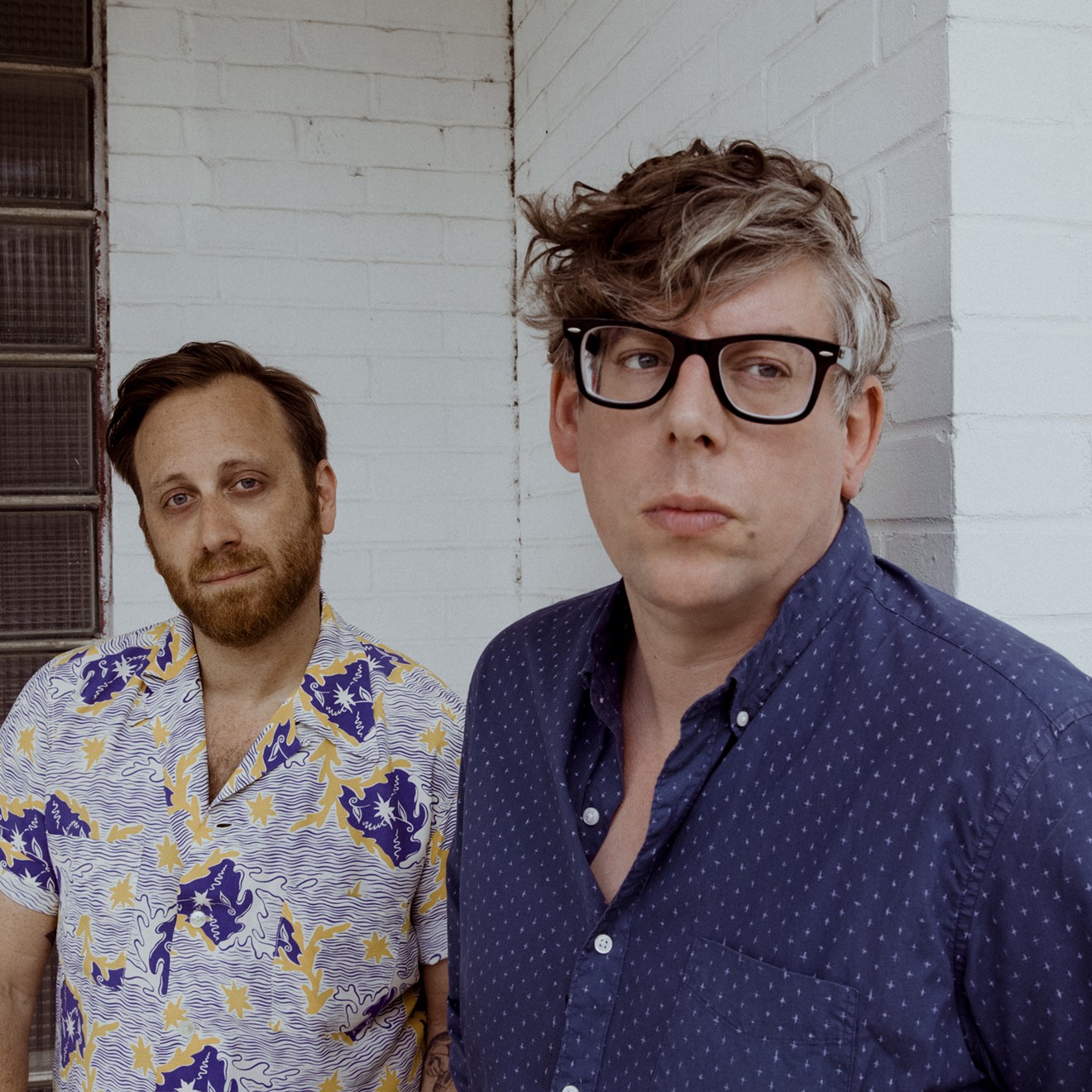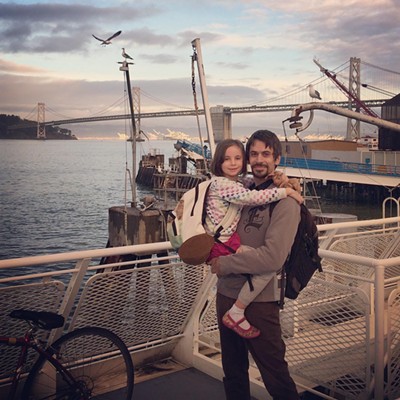Drummer Patrick Carney never attended an arena show until his band played one.
That band, of course, is The Black Keys, the gritty rock duo Carney started with guitarist Dan Auerbach in Akron, Ohio, in 2001.
“I remember driving to Toledo, to one of our first shows, and Dan’s father decided to tag along with us. This was to play to probably twenty people, if that," Carney says over the phone from his home in Nashville before leaving for the group's first tour in over four years. "Dan’s dad was basically busting my balls, because I told him that the definition of success for a band was if you could sell 150 tickets.”
“He said, ‘One day you might be playing the Gund Arena,’ which was the name of the Cleveland arena, and I said, ‘Bullshit — it’s never gonna happen,’" recalls Carney. "It just seemed impossible. It seemed preposterous to even think that.”
These days, the impossible vision of the Black Keys packing arenas has become very real. On September 23, Carney and Auerbach will stop at the Pepsi Center as part of a Black Keys reunion tour that will span three months, two countries, and a hell of a lot of arenas.
“Honestly, half the time when I think about the fact that we’re gonna go play these places, I still think it’s a little bit insane, you know?,” Carney says. "But then the more I rationalize it, there have been so many terrible bands that have played these same venues, so it’s okay.”
It's pointed out that the Backstreet Boys recently played the Pepsi Center.
“Yeah, even worse than them,” says Carney, deadpan. “Like, Christmas-themed rock bands play places bigger than we’ve played.”
He's right: The Trans-Siberian Orchestra will play the venue later this year.
“Dan and I have been playing music together for over twenty years, but it’s important to me that the Black Keys is something that we’re both proud of and something that’s fun, that it feels like a family and doesn’t feel like a daunting responsibility," Carney explains. "And it kind of ended up feeling a little bit out of our hands for a while, after [2011's] El Camino.
“I remember we played right before the Foo Fighters at the Reading Festival [in 2012]. We had sold out three nights at the Alexandria Palace, which is like 10,000 people a night. We came back and played direct support to Foo Fighters in front of, like, 90,000 people, and I remember coming off the stage, getting a beer or something, and our agent walked up to us and said that we needed to come back in December ‘to really make a statement to the British press,'" he says.
“I said, ‘What do you mean?’ and he was like, ‘Well, you have to make a statement. You have to come back. You can sell out two nights at the O2 Arena,’" Carney continues. "I was like, ‘How many tickets is that?’ and he said, ‘Thirty thousand tickets.’ I was like, ‘We just did 30,000. Isn’t that a statement?’ And then you realize, these guys are getting commissions on all of this shit. You’re just having to go and do three weeks of more shows because you get scared into thinking that all your other work is wasted, only to go find out that there’s no fucking statement.
“The most important thing is the health of the band, but that gets forgotten pretty easily when other people take the driver’s seat," he adds. "That was the guiding statement for Dan and I getting back together, that we just have to make sure that everything we do is fun for us, enjoyable.”
Carney, 39, says that when he and Auerbach, 40, met in grade school, they were listening to Vanilla Ice. Later it was Nirvana. When the two friends made the Black Keys' gritty 2002 debut, The Big Come Up, Carney put a $1,000 TASCAM recorder on a credit card because the record deal they signed was “for zero dollars.”
They’ve climbed a very long way, from basement recordings and small clubs to Grammys and arenas.
“In San Francisco, for instance, our first show was for, like, twenty people. Here we are, thirteen years later, playing to 80,000 people [at Outside Lands]. We’d gone from the bottom to the top, for real, and we both had been spending so much time on the road with the Keys. We knew Dan wanted to spend some time at home; he’d just had a kid. He needed a break more than I did at the time. But it took me only a couple months to realize that I needed a break as well.”
Taking those four years off from the Black Keys got Carney the one thing he didn’t even realize he was pining for: a family.
“During the four years we’ve taken off the road or whatever, I had a family," Carney says. "So it was, like, the best break you could ever have. I ended up getting the things that I wanted the most.”
During the Black Keys’ hiatus, Carney produced a slew of albums and married singer Michelle Branch; they have a son who just turned one. Carney notes that he’s only agreeing to do this 33-date tour because he was able to arrange time to see his little boy.
“I don't look at it as being three months; I look at it as being two three-week tours,” Carney says. “I’ve been able to figure out how to get him on the tour just enough so that I don’t go the whole three weeks without seeing him, but I can’t imagine if we were going out on the road for eight months. What the hell would that look like? You’d think rock and roll and this band are, like, the most important things to me, but you have a kid and…if you value rock and roll over your kid, there’s something fucking wrong with you.
“I love rock and roll. I love music. But you hold your kid in your hands the first time, and you know," he continues. "A guy like me — it’s like, ‘Fuck, my life’s completely changed.’ I quit smoking and did all that shit. I want to be around him, too. I also have a stepdaughter who’s fourteen, and she needs a lot of guidance constantly. This whole touring thing’s, like, what can we do sustainably so that I feel like I’m not abandoning my family for months at a time?”
Presumably having found that balance, Carney and Auerbach are back in the business of being the Black Keys, both in the studio and on the road.
“The reason Dan and I work is that there’s two of us, and we know each other so well that when one of our egos flares up, we kinda know how to check it, you know what I mean?" Carney says. "Ultimately, we’re on the same page, and I back off on certain things, Dan backs off on certain things. But if you have, like, a schism in certain bands where you have two people fighting for different things — like you have one person bringing in a song like ‘When I’m Sixty-Four’ and then one person bringing in ‘Happiness Is a Warm Gun' — those people wouldn’t want to be in a room together.
“Dan and I spend a lot of time together, and ultimately, we both love to make music," Carney continues. "We made ['Let's Rock'] without a producer, because we needed to get that feeling back of what it’s like to just be the two of us supporting each other in the studio and enjoying it, having fun. We’ve done a few records with Danger Mouse, and he’s one of our best friends, but after going five years without making a record, we needed to just get back in there as the two of us and spend some time together, really.”
A lot of bands — Cream, the Talking Heads, even the Beatles — would possibly have delivered many more superb albums and performances if they’d just had some breathing room, Carney laments.
“I think a lot of bands need to take a break. I wonder, like, what would have happened if the Clash had decided, before the band imploded, if they’d been like, ‘Let’s just go to Jamaica for three years on vacation.’ It probably would have been the best thing they ever fucking did.”
The Black Keys, with Modest Mouse and *repeat repeat. 7 p.m. Monday, September 23, Pepsi Center, 1000 Chopper Circle, 303-405-1100, $39.50-$499.50, pepsicenter.com.
[
{
"name": "Air - MediumRectangle - Inline Content - Mobile Display Size",
"component": "12017618",
"insertPoint": "2",
"requiredCountToDisplay": "2"
},{
"name": "Editor Picks",
"component": "17242653",
"insertPoint": "4",
"requiredCountToDisplay": "1"
},{
"name": "Inline Links",
"component": "18838239",
"insertPoint": "8th",
"startingPoint": 8,
"requiredCountToDisplay": "7",
"maxInsertions": 25
},{
"name": "Air - MediumRectangle - Combo - Inline Content",
"component": "17261320",
"insertPoint": "8th",
"startingPoint": 8,
"requiredCountToDisplay": "7",
"maxInsertions": 25
},{
"name": "Inline Links",
"component": "18838239",
"insertPoint": "8th",
"startingPoint": 12,
"requiredCountToDisplay": "11",
"maxInsertions": 25
},{
"name": "Air - Leaderboard Tower - Combo - Inline Content",
"component": "17261321",
"insertPoint": "8th",
"startingPoint": 12,
"requiredCountToDisplay": "11",
"maxInsertions": 25
}
]












